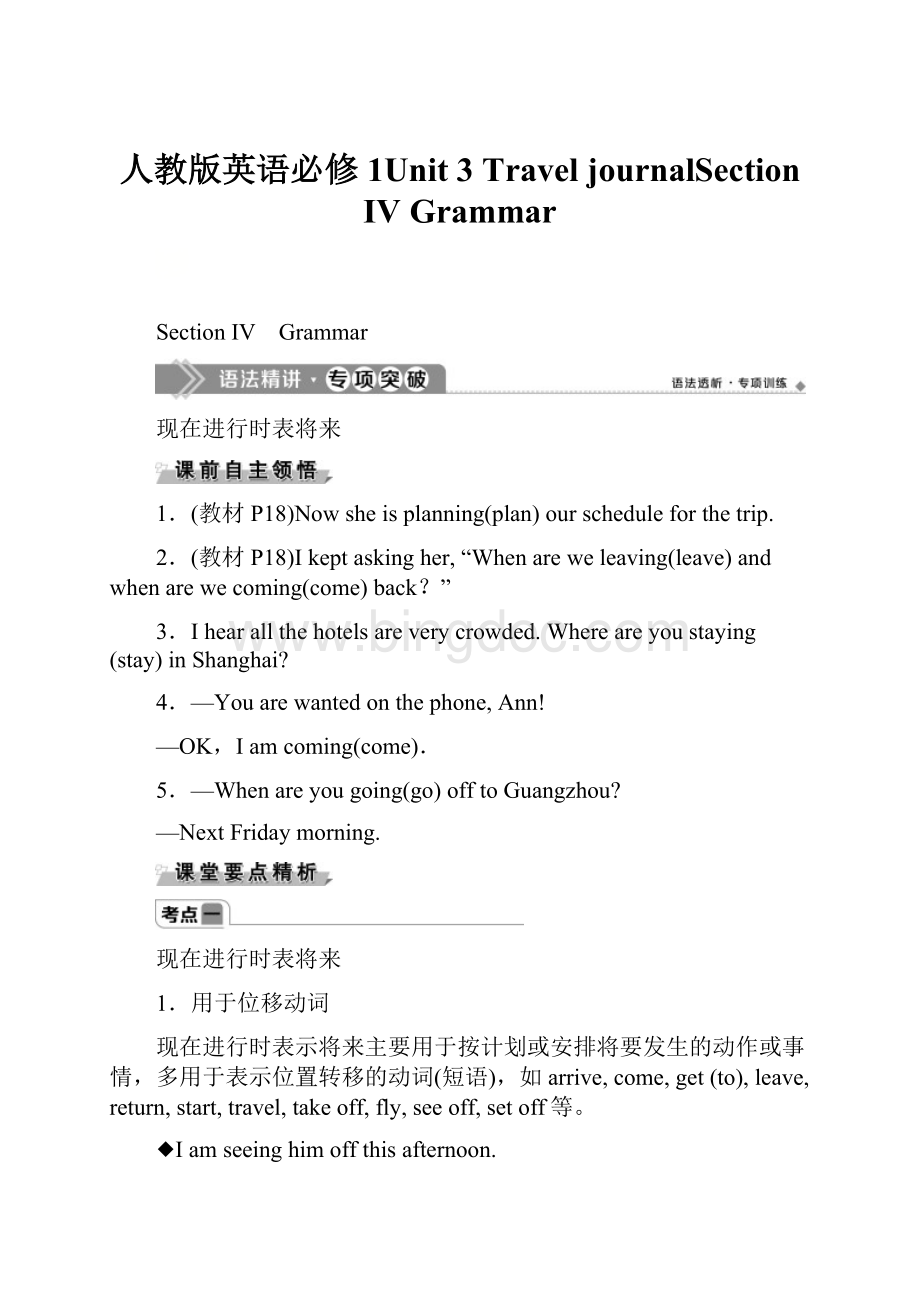人教版英语必修1Unit 3 Travel journalSection Ⅳ Grammar.docx
《人教版英语必修1Unit 3 Travel journalSection Ⅳ Grammar.docx》由会员分享,可在线阅读,更多相关《人教版英语必修1Unit 3 Travel journalSection Ⅳ Grammar.docx(14页珍藏版)》请在冰点文库上搜索。

人教版英语必修1Unit3TraveljournalSectionⅣGrammar
SectionⅣ Grammar
现在进行时表将来
1.(教材P18)Nowsheisplanning(plan)ourscheduleforthetrip.
2.(教材P18)Ikeptaskingher,“Whenareweleaving(leave)andwhenarewecoming(come)back?
”
3.Ihearallthehotelsareverycrowded.Whereareyoustaying(stay)inShanghai?
4.—Youarewantedonthephone,Ann!
—OK,Iamcoming(come).
5.—Whenareyougoing(go)offtoGuangzhou?
—NextFridaymorning.
现在进行时表将来
1.用于位移动词
现在进行时表示将来主要用于按计划或安排将要发生的动作或事情,多用于表示位置转移的动词(短语),如arrive,come,get(to),leave,return,start,travel,takeoff,fly,seeoff,setoff等。
◆Iamseeinghimoffthisafternoon.
今天下午我去给他送行。
◆We’releavingforShanghaithisafternoon.
今天下午我们将动身去上海。
◆Theplaneisarrivingin10minutes.
飞机将在10分钟内到达。
【即时演练1】——补全句子
①她今晚将动身去新加坡。
SheisleavingforSingaporetonight.
②你什么时候动身去度假?
Whenareyousettingoffforyourholiday?
③他乘坐的飞机将于9:
20起飞,所以他必须在8:
30之前到机场。
Hisplaneistakingoffat9:
20,sohemustbeattheairportby8:
30.
2.用于非位移动词
现在进行时表示将来除使用位移动词外,也可使用某些非位移动词,如do,buy,meet,have,play,finish,stay,publish等,此时句中一般要有表示将来的时间状语。
◆Theyoungmanismeetinghisgirlfriendthisafternoon.
这个年轻人今天下午要去接他的女朋友。
◆Iampublishingabookthisyear.
我打算今年出一本书。
【即时演练2】——补全句子
①下星期天你打算干什么?
WhatareyoudoingnextSunday?
②我妈妈不久将给我买辆自行车。
Mymotherisbuyingmeabikesoon.
③我下课后见你。
Iammeetingyouafterclass.
其他表将来的表达方式
1.will/shalldo表将来
will/shalldo表示单纯的将来,是对未来事情发生的“预见性”。
will用于各种人称,而shall一般用于第一人称。
◆Shewillcomebacknextweek.
她将于下周回来。
◆Iwillgotherebymyself.
我将自己去那里。
表示事先未经过考虑的打算、计划,是在说话时才想到或决定的事,即临时起意,这时通常用will。
◆—Whereisthetelephonebook?
——电话号码簿在哪里?
—I’llgoandgetitforyou.
——我去给你拿。
【即时演练3】——用所给词的适当形式填空
①—DoyouthinkMomandDadwillbe(be)late?
—No,SwissAirisusuallyontime.
②—Mr.Wangisillinhospital.
—Oh,Iwillgo(go)toseehim.
2.begoingtodo表将来
begoingtodo表示打算、计划、安排或已经决定要做某事;还可表示根据某种迹象表明将要发生的事。
◆Areyougoingtowatchthefootballgamethisafternoon?
你打算今天下午看足球赛吗?
◆Lookatthedarkclouds!
It’sgoingtorain.
看这些乌云!
天要下雨了。
【即时演练4】——补全句子
——放学后我打算去打篮球。
——真的?
我要和你一起去。
—Iamgoingtoplaybasketballafterschool.
—Really?
Iwillgowithyou.
3.betodo表将来
betodo表示按计划中约定的或按职责、义务、要求必须去做的事或即将发生的动作。
◆Youaretobebackby9o’clock.
你必须(应该)9点以前回来。
【即时演练5】——补全句子
①告诉她不要回来晚了。
Tellherthatsheisnottobebacklate.
②婚礼定于下周日举行。
TheweddingistotakeplacenextSunday.
4.beabouttodo表将来
(1)beabouttodo意为“刚要;正要”,表示即将发生的动作,不与具体时间连用。
◆You’dbetterfastenyourseatbelt.Theplaneisabouttotakeoff. 你最好系好安全带,飞机马上要起飞了。
(2)beabouttodo...when...是固定句式,意为“正要做……,这时……”。
◆Shewasabouttoleavewhensomeguestscame.
她正要离开,这时来了一些客人。
【即时演练6】——补全句子
①我正要进来,这时他突然闯出来。
Iwasabouttocomeinwhenherushedout.
②我正要锁门,这时电话响了。
Iwasabouttolockthedoorwhenthetelephonerang.
5.一般现在时表将来
一般现在时表示将来,表示按照日程表或时刻表的安排要发生的事,如火车(汽车)出发、船只离岸、飞机起飞等,或用于时间和条件状语从句中。
◆Thebusleavesat9:
00pm.汽车将于晚上9点离开。
【即时演练7】——用所给词的适当形式填空
①Newtermbegins(begin)onSeptember1st.
②I’llwritetoyouassoonasIget(get)there.
单句语法填空
1.(2017·全国卷Ⅱ)Whensummercomes(come),theywillinvitetheirstudentstopickthefreshvegetables!
2.Becausetheshopisclosing(close)down,everythingissoldathalfprice.
3.Hisplanetakes(take)offat8:
00tomorrow.Wouldyouliketoseehimoff?
4.Heisleaving(leave)tomorrowtoplayhisfirstmatch.
5.Sandywillhavetogetupveryearlytomorrowmorning,becauseheistaking/willtake(take)the6:
00amtraintoChicago.
6.Springiscoming/willcome(come),andtheweatherisgettingwarmerandwarmer.
7.Don’tworryaboutme.Iamstaying/willstay(stay)inEgyptforonlytwoweeks.
8.Sophiaisgoing/willgo(go)totheairportbecauseshehastopickuphergrandmatonight.
9.Ladiesandgentlemen,pleaseturnoffyourcellphonesorlaptops.Theplaneistaking(take)off.
10.Ifyoucome(come)tomyhometownnextmonth,I’lltreatyoutoabigdinner.
语法与写作
1.这对夫妻暑假期间将把孩子送去夏令营。
Thecouplearesendingtheirkidtoasummercampduringthesummerholiday.
2.他两小时后将赴伦敦和经理会面。
HeisleavingforLondonintwohourstomeetwithhismanager.(leave)
3.下周五我们将乘飞机去上海出席一个重要的会议。
WeareflyingtoShanghainextFridaytoattendanimportantmeeting.(fly)
4.下课后我们打算在操场踢足球。
Afterclass,wearegoingtoplayfootballontheplayground.(play)
5.期中考试就要到了,每一个人都在努力复习功课。
Themid-termexamiscoming,andeveryoneistryinghardtoreviselessons.
6.如果明天天气好,我们就去爬山。
Ifitisfinetomorrow,wewillgoclimbing.
单句语法填空
1.Weareflying(fly)toShanghaitomorrowsowe’dbettergetourpackagepackednow.
2.Ihavemyownplan.Iamgoingtodo(do)myhouseworkthisafternoon.
3.Pleasecallthestationtomakesurewhentheearliesttrainleaves(leave).
4.Ladiesandgentlemen,payattentionandlookout.Ourplaneislanding(land).
5.Thetrainwasabouttoleave(leave)andIwasnotevenontheplatform.
6.Myfriend,Tom,isgoing(go)toQingdaoforthesummerholidaynextweek.
7.DoyouknowwhenMr.Browniscoming(come)back?
8.WillyoukindlyobeytheinstructionsIamabouttogive(give)?
9.Maryisleaving(leave)forShenyangbyplaneat3:
00thisafternoon.
10.Whenourguestarrives(arrive),Iwillpickhimupattheairport.
阅读理解
A
(2019·北京高一检测)Nowmanyyoungpeoplearetravelingaroundtheworldontheirown,notbecausetheyhavenoonetotravelwith,butbecausetheyprefertogoalone.
KristinaWegscheiderfromCaliforniafirsttraveledalonewhenshewasatcollegeandbelievesthatitissomethingeveryoneshoulddoatleastonceintheirlife.“Itopensupyourmindtonewthingsandpushesyououtofyourcomfortzone.”Wegscheiderhasvisited46countriescoveringallsevencontinents.
Inforeigncountries,withnoonetohelpyoureadamap,lookafteryouifyougetill,orlendyoumoneyifyourwalletisstolen,itischallenging.Thisiswhatdrivesyoungpeopletotravelalone.Itisseenascharacterbuildingandachancetoprovethattheycanmakeitontheirown.
ChrisRichardsondecidedtoleavehissalesjobinAustraliatogotravelinglastyear.Hesetupawebsite,TheAussieNomad,todocumenthisadventures.Hesaidhewishedhehadtraveledaloneearlier.“Thepeopleyoumeet,theplacesyouvisit,orthethingsyoudo,everythingisuptoyouanditforcesyoutogrowasaperson,”saidthe30-year-old.
Richardsondescribestravelingalonelike“ashotinthearm”,which“makesyouamoreconfidentpersonthatisreadytodealwithanything”.Hesaid,“ThefeelingofhavingconqueredsomethingonmyownisamajorpartofwhatdrivesmeeachdaywhenI’mdealingwithadifficulttask.IwalkaroundwithmyheadupbecauseIknowdeepdowninsidethatnothingisimpossibleifyoutry.”
Thegreat19thcenturyexplorerJohnMuironcesaid,“Onlybygoingaloneinsilencecanonetrulygetintotheheartofthewilderness.”
【解题导语】 本文提到现在年轻人流行的旅行方式,独自一人去,不是因为没有人做伴而是想独自一个人去面对旅行中遇到的种种问题,挑战自我,让自己变得更自信。
1.Whyisitchallengingtotravelalone?
A.Itwillfinallybuildyourcharacter.
B.Youhavetomakethingsonyourown.
C.Itishardforyoutoproveyourselftoothers.
D.Youdependonyourselfwhateverhappens.
D 解析:
推理判断题。
由第三段第一句话Inforeigncountries,withnoonetohelpyoureadamap,lookafteryouifyougetill,orlendyoumoneyifyourwalletisstolen,itischallenging.可知,独自旅行是很有挑战性的,因为独自旅行时,一切都要靠自己。
2.WhichofthefollowingwillKristinaWegscheideragreewith?
A.Travelingabroadhelpspeopletofindnewthings.
B.Itismoremeaningfultotravelinforeigncountries.
C.Itiscomfortabletotravelaroundwithoutafriend.
D.Travelingaloneisanecessaryexperienceforeveryone.
D 解析:
细节理解题。
由第二段第一句话...believesthatitissomethingeveryoneshoulddoatleastonceintheirlife.可知,Wegscheider认为每个人都应该至少独自旅行一次,所以D项正确。
3.WhatcanweinferaboutChrisRichardson?
A.Hestartedtravelingatanearlyage.
B.Hewasonceshotinthearm.
C.Heusedtoworkasasalesman.
D.Hiswebsiteinspiresothersalot.
C 解析:
推理判断题。
由第四段第一句话ChrisRichardsondecidedtoleavehissalesjobinAustraliatogotravelinglastyear.可知,ChrisRichardson过去的职业是销售员。
由第四段第三句话Hesaidhewishedhehadtraveledaloneearlier.可知,A项错误;由第五段第一句话可知,B项错误;D项无交代,所以不选。
4.Whatisthebesttitleforthepassage?
A.TravelWideandFar
B.TravelUnaccompanied
C.TravelLight
D.TravelAbroad
B 解析:
标题归纳题。
根据文章第一段Nowmanyyoungpeoplearetravelingaroundtheworldontheirown,notbecausetheyhavenoonetotravelwith,butbecausetheyprefertogoalone.可知,本文讲的是无陪伴的旅游。
B项作为题目最合适。
B
CoffeeisanimportantpartofItaliancultureandsincearrivinghereoversixmonthsago,Ihavedrunkalotofit!
Ofcourse,coffeeisalsoverypopularintheUKbutcoffeecultureinItalyisacompletelydifferentstory.InItaly,whenyouorderacoffeeinacaféorbar(酒吧),youareservedwithatiny,bitterespresso.Thisis“normal(正常的)coffee”forItaliansandtheyarenotsointerestedinthehugecoffeesthatwedrinkintheUK.Ifyouwantmorethanonesip(小口)ofcoffeeinItaly,lungoisagoodchoice.Itisespressowithalittlemorewateradded,butstillservedinasmallcup.Inaddition,whiletakeawaycoffeeisquitepopularamongBrits,itisnotverycommonatallinItaly,especiallyinnon-touristyareas.Generally,Italiansprefertodrinktheirtinycoffeeswhilestandingatthebarand,formany,thisshortbreakisanimportantpartoftheirday.
Usually,breakfastinabarinItalyincludesacoffeeandapastry(酥皮糕点).IhavebeenspoiledforchoicewithlovelycafésintheItaliantownI’mlivingin.Thesecafésselldifferentkindsofmouth-wateringpastries—eitherplain(无馅料的)orfilledwithcream,chocolate,etc.—aswellasdeliciouscoffee.Cappuccinosareverypopularatbreakfasttimeand,forme,acreamycappuccinoandapastrywithchocolateistheperfectwaytostarttheday.
Finally,Ihav